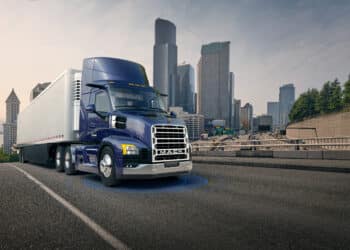Truck lenders ‘underwrite wrong things,’ analyst says
Background, knowledge count more than credit score for some lenders
Truck lenders must look beyond traditional credit metrics to find strong operators in light of industry challenges, with a heightened focus on asset expertise.
As overcapacity and credit issues persist in trucking, many lenders are pulling back from the transportation sector to avoid risk. Highlighting the challenges, 12 freight carriers filed for Chapter 11 bankruptcy in October, following 10 in September.
Read more on bankruptcies here.
Sixty percent of truck dealers reported deteriorating used-truck demand in the third quarter, according to heavy-equipment research firm IronAdvisor Insights.
While truck financing woes can be attributed to legitimate industry challenges, many lenders have struggled because they “underwrite the wrong things,” Dean Croke, principal analyst at DAT Freight and Analytics, an industry research firm and service provider, told Equipment Finance News.
In trucking, it’s imperative for lenders to consider factors that are not often measured by a conventional scorecard, he added.
“A lot of times, it’s personal observation,” Croke said.
“If you sent me a picture of your trucks, I could tell you about your ability to repay the loan — not from what you fill in on a form, not from your balance sheet — because it tells me about how you operate your equipment.”
— Dean Croke, DAT Freight and Analytics
The right questions
Most transportation lenders prioritize questions about credit history and time in business during the pre-approval process, Chris Grivas, president of Chadds Ford, Pa.-based CAG Truck Capital, told EFN. However, these questions do not always gauge an applicant’s “roots and resourcefulness,” or the ability to take care of collateral and navigate challenges, which can motivate financing decisions more than credit history, he said.
Instead, CAG prioritizes these questions to determine roots and resourcefulness:
- How did you hear about us?
- How long have you been around trucking?
- Do you have any friends or family in the trucking business?
This approach helps lenders identify skilled owner-operators and whether the applicant is cut out for the daily grind of trucking, Grivas said, noting that these qualities could be overlooked when adhering to rigid credit standards.
For example, an applicant with a low credit score and minimal time in business may have a dad who was an owner-operator and is highly knowledgeable of trucks, boosting lender confidence, Grivas said. Sometimes lenders also learn that previous credit blemishes were tied to an extenuating circumstance that does not reflect the borrower’s ability to operate and maintain trucks, he said.
“We’re not talking necessarily about his credit score. We’re talking about his background,” Grivas said.
Conversely, if a borrower has a high credit score and a strong balance sheet but lacks the fundamental knowledge of trucking and industry dynamics, lenders should proceed with caution, he said.
“What you discover is that they do have an 800 credit score, but that’s because they have a Target and a Walmart credit card that they charged a pair of sneakers, two pairs of pajamas and a hoodie to and made their payments on time,” he said. “And when you finish speaking to them, you realize that if you jacked up the front end of their mom’s Toyota Camry, loosened the bolts on the front left tire, took the tools out of the trunk, put it down on the ground, they wouldn’t know how to change a tire.”
In addition, Grivas said that he might provide more favorable terms to an owner-operator with proven knowledge of trucks.
“If you have someone with the roots and resourcefulness, you might go a little lighter on the down payment,” he said. “You might go a little longer on the term.”
Register here for the free Equipment Finance News webinar “Tech-driven risk management: How innovation is reshaping equipment finance” set for Tuesday, Dec. 9, at 11 a.m. ET.









